Glen
Campbell

-
Inducted2005
-
Born
April 22, 1936
-
Died
August 8, 2017
-
Birthplace
Delight, Arkansas
A gifted singer and accomplished guitarist, Glen Campbell became an international superstar with a string of pop and country hits released in the 1960s and ‘70s. At his peak, he also hosted a musical variety television show and starred in several feature films.
Early Musical Work
The seventh son in a sharecropper’s family of twelve children, Glen Travis Campbell was born into hard times, but he set himself apart from an early age with his proficiency on guitar. He was playing in his uncle’s western swing band by the time he was a teenager.
By his early twenties, Campbell had moved to the West Coast. From October 1960 until May 1961, he toured as lead guitarist for the Champs, two years after they hit with “Tequila.” His first pop hit came in 1961 with “Turn Around, Look at Me” on Crest Records, and his first recording to hit the country charts was the 1962 Green River Boys single “Kentucky Means Paradise,” on which Campbell played guitar and sang. The group released only one album, Big Bluegrass Special, however, and Campbell remained largely unknown to the public.
Campbell signed with Capitol Records in 1962 but recorded without success for several years. During this period, he was in much more demand as a session guitarist and vocalist than as an artist: he worked with the Beach Boys, Bobby Darin, Merle Haggard, the Mamas & the Papas, Dean Martin, Rick Nelson, Frank Sinatra, and countless others. He also toured briefly with the Beach Boys, as Brian Wilson’s replacement, in 1964.
Songs
00:00 / 00:00
00:00 / 00:00
00:00 / 00:00
Solo Success
Throughout the early and mid-‘60s, Campbell poured his instrumental prowess into his own records, cutting several guitar-dominated albums, including two with dobro specialist Tut Taylor and the Dillards in an ensemble billed as the Folkswingers. His breakthrough came with John Hartford’s modern hobo song “Gentle on My Mind” in 1967. Though it only reached #30 on the country chart and #39 on the pop chart, the song struck a chord with listeners. In 1990, in a testament to its abundant radio airplay, BMI named the song its fourth-most-played song to date.
Campbell scored his first country Top Five in 1967 with “By the Time I Get to Phoenix” and gained his first Top Five pop hit with “Wichita Lineman” one year later. Between 1967 and 1980, he effortlessly straddled country and pop, racking up thirty Top Twenty country hits and nineteen Top Forty pop records, including the crossover smashes “Galveston” (1969), “Country Boy (You Got Your Feet in L. A.)” (1975), “Southern Nights” (1977), and his signature song, “Rhinestone Cowboy” (1975).
At his peak, Campbell also hosted The Glen Campbell Goodtime Hour, a musical variety television show that ran on CBS from 1968 to 1972, and starred in several feature films, including True Grit (1969) with John Wayne.
Glen Campbell was born into hard times, but he set himself apart from an early age with his proficiency on guitar.
Videos
“Southern Nights”
“Try a Little Kindness”
Photos
-
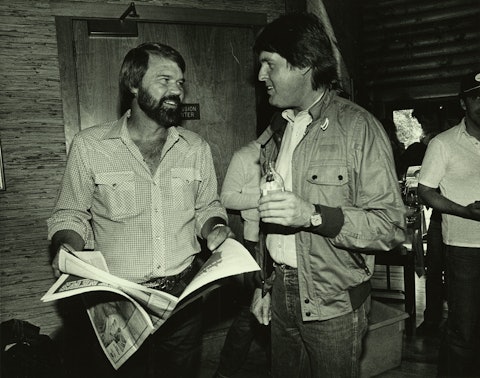
Glen Campbell and Harold Shedd, 1983. Photo by Bill Easley.
-
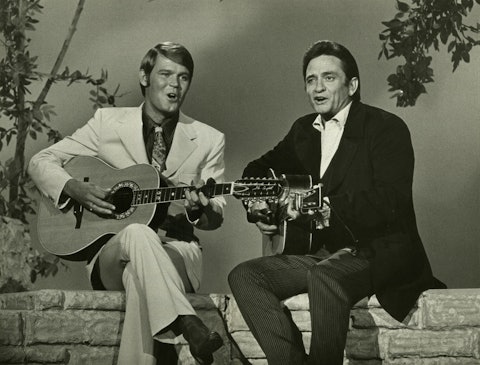
Glen Campbell and Johnny Cash performing on The Johnny Cash Show, 1969.
-
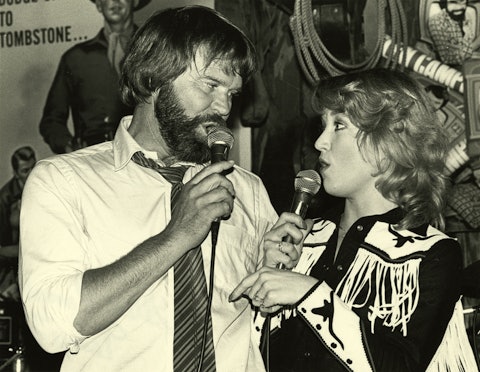
Glen Campbell and Tanya Tucker, 1981. Photo by Ebet Roberts.
-
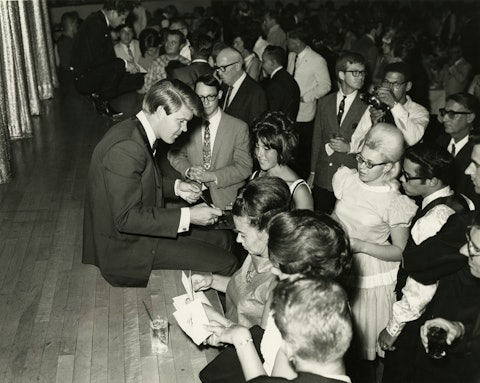
Glen Campbell signing autographs for fans, 1960s.
-
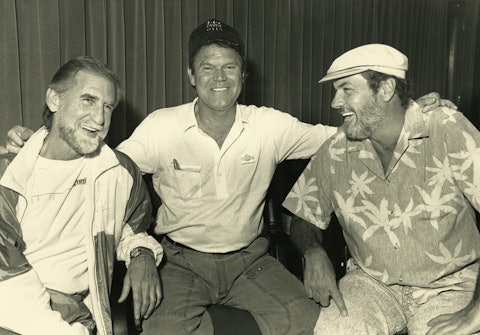
From left: Jerry Crutchfield, Glen Campbell, and Jimmy Bowen, 1990s. Photo by Beth Gwinn.
-
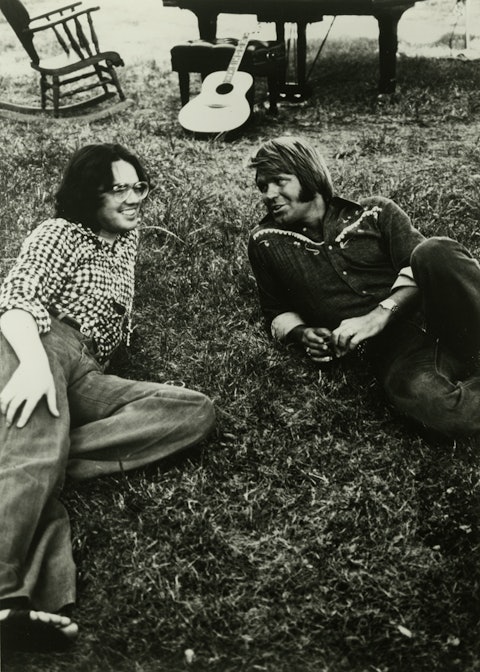
Glen Campbell and Jimmy Webb taking a break during recording sessions for Campbell’s album Reunion, 1974.
-
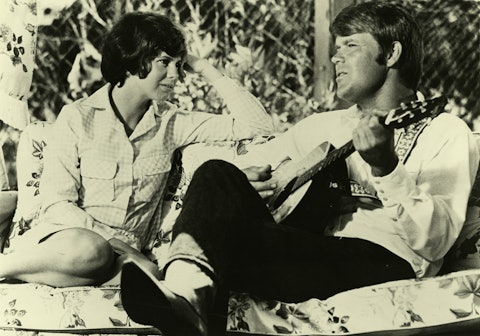
Glen Campbell and Kim Darby on the set of the film Norwood, 1970.
-
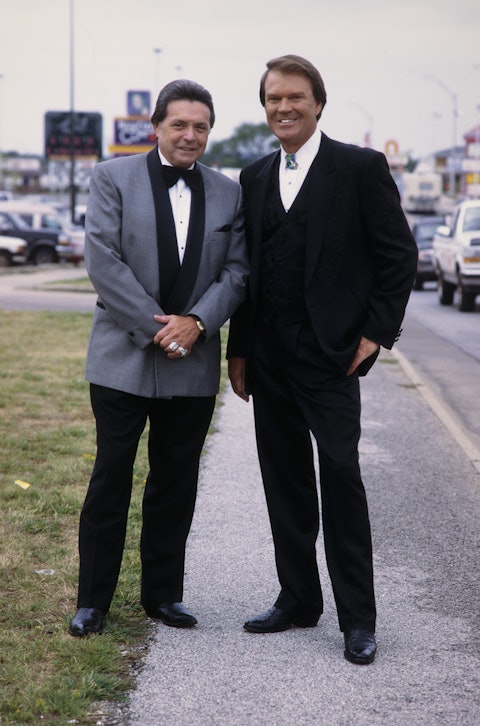
Glen Campbell and Mickey Gilley in Branson, Missouri, 1996. Photo by Raeanne Rubenstein.
-
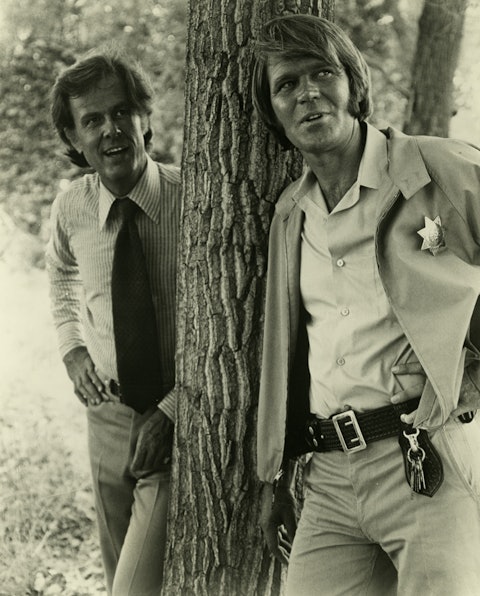
Glen Campbell and Robert Culp on the set of the television movie Strange Homecoming, 1974.
-
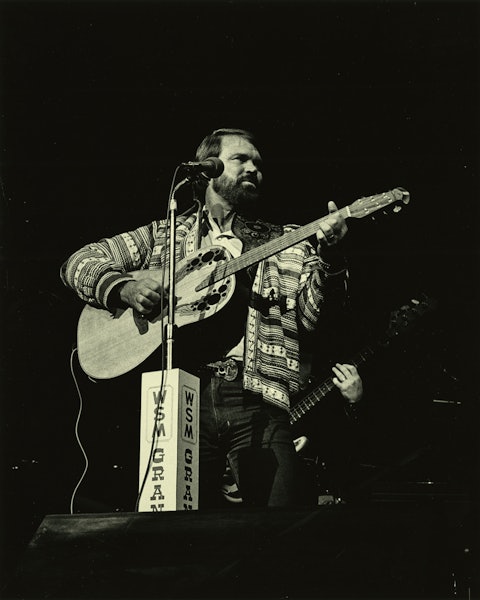
Glen Campbell at the Grand Ole Opry, 1983. Photo by Les Leverett.
Tumultuous Later Years
During the 1980s, Campbell recorded for Warner Bros. and Atlantic, and continued to have occasional Top Ten country hits. He lost commercial standing, however, as he dealt with substance abuse, three divorces, and a much-publicized tempestuous engagement to Tanya Tucker.
In 1987, Campbell was signed to MCA’s country division by record producer Jimmy Bowen, with whom he had worked extensively during West Coast recording sessions in the 1960s. Before returning to Capitol in 1990, Campbell had Top Ten hits at MCA with “The Hand That Rocks the Cradle” (with Steve Wariner), “Still Within the Sound of My Voice,” and “She’s Gone, Gone, Gone.” In 1994, he published a memoir, Rhinestone Cowboy: An Autobiography, co-authored with Tom Carter.
Campbell announced in 2011 that he had been diagnosed with Alzheimer’s disease, and planned a farewell tour. His final performance took place in November 2012, in Napa, California. A 2014 documentary, I’ll Be Me, earned wide praise for its frank look at Alzheimer’s and how it affected Campbell and his family and friends; its soundtrack, produced by Julian Raymond, won a Grammy, and its song “I’m Not Gonna Miss You” was nominated for an Academy Award for Best Original Song.
An album recorded during Campbell’s final studio sessions in 2012 and 2013, Adios, was released on June 9, 2017. Two months later, on August 8, Campbell died.
— Bob Allen
Adapted from the Country Music Hall of Fame® and Museum’s Encyclopedia of Country Music, published by Oxford University Press



